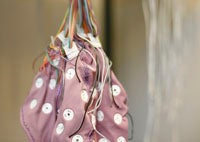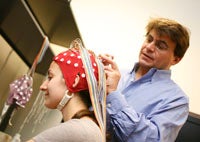Going Native – In Language Learning

Posted in GUMC Stories
 How does a person learn to speak French like a Frenchman or Spanish like a Spaniard? Most people think the best way would be just to live in those countries, immersed in the native tongue. But studies on the subject have generally found that classroom instruction is better ⎯ because it produces superior test results.
How does a person learn to speak French like a Frenchman or Spanish like a Spaniard? Most people think the best way would be just to live in those countries, immersed in the native tongue. But studies on the subject have generally found that classroom instruction is better ⎯ because it produces superior test results.
However, classroom scores didn’t convince Michael Ullman, Ph.D., a professor of neuroscience at Georgetown University Medical Center (GUMC). He knows a lot about second languages ⎯ he is fluent in French, after 12 years of studying the language in a French-American bilingual school in California. He says he can get “crudely by” in Spanish and Italian.
But he wonders sometimes if his ability to speak French wasn’t greatly enhanced by interacting with his best friend, who was French Swiss, even as he was learning French at his school in San Francisco. “His family spoke French and I stayed at their house a lot, which, I think, helped my French enormously,” Ullman says.
So, together with his Georgetown colleagues, he did something no one else has done to date ⎯ he employed his expertise as a neuroscientist to look at how an individual’s brain handles language acquisition (specifically syntax, that is, the grammar of sentences), comparing classroom teaching to an immersion exercise.
The result is detailed in two linked studies– the latest published March 28 in PLoS ONE and another published online last August in the Journal of Cognitive Neuroscience (JoCN).
The scientists showed that when learning a foreign language by immersion, adults attain and retain the brain patterns of native speakers.
Taken together, both studies demonstrate that the kind of exposure you have to a foreign language can determine whether you achieve native-language brain processing, and that learning under immersion conditions may be more effective in reaching this goal than typical classroom training. But they also show “that the brain consolidates knowledge of the foreign language as time goes on, much like it does when a person learns to ride a bike or play a musical instrument,” Ullman says.
What Ullman and his colleagues have done is to show just how foreign language learners can achieve native-like processing of grammar.
He hopes that someday, his research will lead to the integration of language training that promotes native-like learning processes into language learning curricula. And his wish is that these same tools could potentially help individuals with language learning disabilities.
Focused on the brain side of language
 After graduating from Harvard College, he earned his Ph.D. at the Massachusetts Institute of Technology (MIT), where his mentor was Steven Pinker, Ph.D. ⎯ the renowned cognitive scientist who argues that language is an instinct borne in human evolution.
After graduating from Harvard College, he earned his Ph.D. at the Massachusetts Institute of Technology (MIT), where his mentor was Steven Pinker, Ph.D. ⎯ the renowned cognitive scientist who argues that language is an instinct borne in human evolution.
He was intending to learn about language so that he could start a company that could do computer-based language translation ⎯ Ullman had helped start the first computer company after graduating from Harvard. “But I got seduced by the science and stayed,” he says. He moved to the brain side of language, and stayed three more years at MIT as a postdoctoral researcher. “I have never left that area of research, and I still love it,” he says.
His interest in how the brain works at the highest level brought him to GUMC’s neuroscience group in 1996. In the last few years he has turned his interests to how humans learn language and retain it over the longer term.
“I have become more interested in applied and translational areas of research,” Ullman says. “For example, I want to know how we can identify children with language learning disorders early enough so that very early intervention is possible.”
To understand the impact of immersion versus classroom grammar instruction, Ullman and his then-graduate student Kara Morgan-Short, Ph.D. (now a faculty member at the University of Illinois at Chicago) came up with a clever experimental design. They taught a small group of participants to speak and understand an artificial language of only 13 words that referred to the pieces and moves of a computer game. Its grammar was constructed to be like that of natural languages, but not like English.
The scientists found that after a few days, participants reached high proficiency in the language, whether they had undergone classroom – or immersion-like training. However, measures of brain processing showed that different types of training led to different brain mechanisms.
“Only the immersion training led to full native-like brain processing of grammar,” Ullman says. “So if you learn a language you can come to use native language brain processes, but you may need immersion rather than classroom exposure.” This was the study published in JoCN.
For the study published in PLoS ONE, the researchers asked another interesting question: What happens after you’ve reached high proficiency in a foreign language, if you don’t keep on being exposed to it? Do you lose the use of any native-language brain mechanisms that you’ve attained? Many learners do not have ongoing exposure, which makes this is a critical question, Ullman says.
So, without having warned their participants beforehand, the researchers asked them to come back about five months later for another round of brain scanning.
They weren’t sure what they’d find, though previous behavioral studies had found foreign language learners did worse after such fallow periods ⎯ the use it or lose it phenomenon.
“To our surprise, the participants actually became more native like in their brain processing of grammar,” Ullman says. “And this was true for both training groups, though it was still the case that only the immersion group showed full native-like processing of syntax.”
Now Ullman and his team are attempting to find out why immersion learning and periods with no exposure help one to reach native-like brain processing of syntax.
“We have lots and lots of next steps, in many different directions,” he says. “We are extremely excited about this research, and how it may help people learn foreign languages and possibly recover from language disorders.”
By Renee Twombly, GUMC Communications
(Published March 28, 2012)
